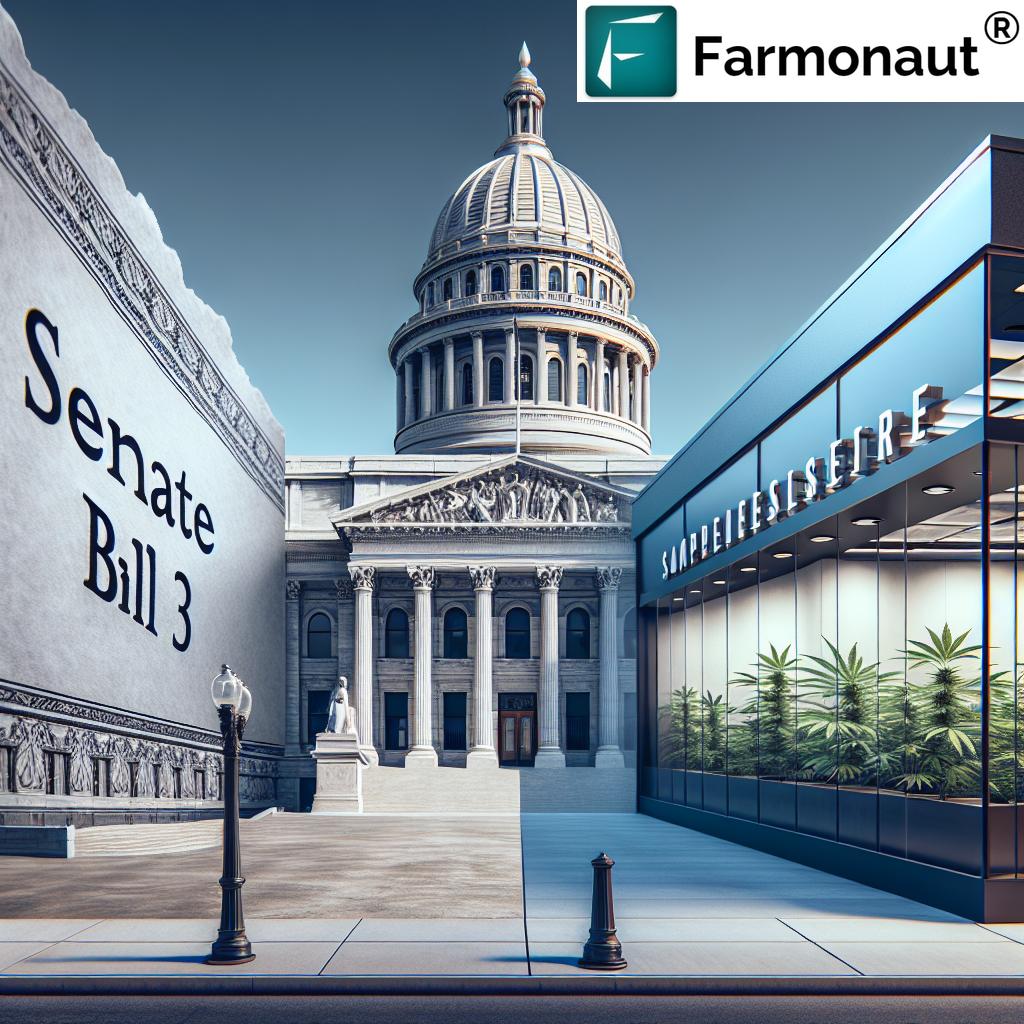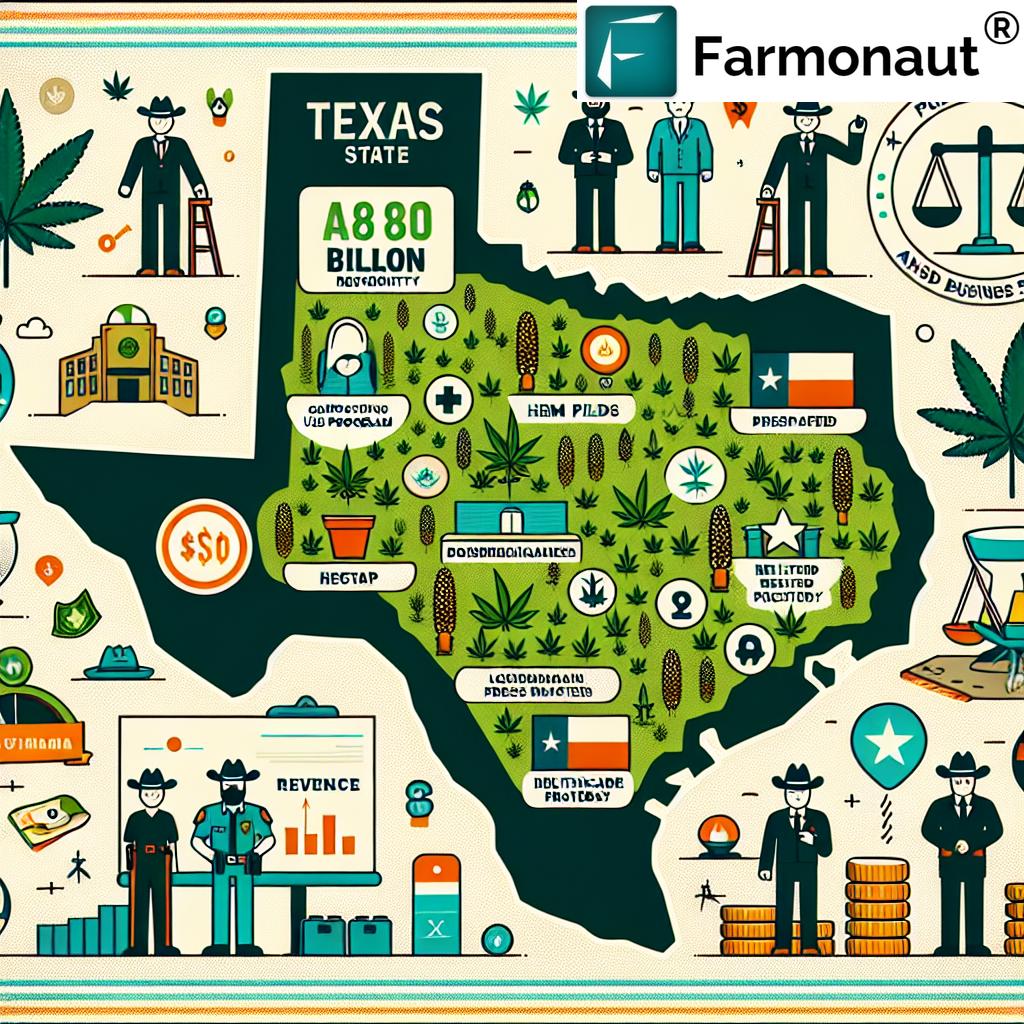Texas Senate Bill 3: The Potential Impact on THC Businesses and Public Safety in the Lone Star State
“Texas’ hemp industry generated $8 billion in revenue in 2023, potentially facing upheaval due to Senate Bill 3.”
As we delve into the complexities of Texas Senate Bill 3 and its potential impact on THC businesses and public safety in the Lone Star State, it’s crucial to understand the far-reaching implications this legislation could have on various sectors of the Texas economy and society. The proposed statewide ban on all THC products has sent shockwaves through the business community, particularly those involved in the hemp and cannabis industries.
Understanding Senate Bill 3: A Comprehensive Overview
Senate Bill 3, introduced by Lt. Gov. Dan Patrick in December, aims to address the unregulated sale of potentially dangerous synthetic cannabinoids in Texas communities. The bill proposes a sweeping ban on all THC products across the state, raising concerns among business owners, consumers, and advocates for medical cannabis use.
The Texas Legislature is currently considering this crucial piece of legislation that could reshape the landscape of THC regulation in the state. As the debate unfolds, stakeholders from various sectors are closely monitoring the situation, anticipating the potential outcomes that could significantly impact their operations and livelihoods.

The Rationale Behind Senate Bill 3
Supporters of Senate Bill 3 argue that the legislation is necessary to protect public health and safety. Lt. Gov. Dan Patrick stated in a press release, “Dangerously, retailers exploited the agriculture law to sell life-threatening, unregulated forms of THC to the public and made them easily accessible. We are not going to allow these retailers to circumvent the law and put Texans’ lives in danger.”
The primary concerns driving this legislative push include:
- The proliferation of unregulated synthetic cannabinoids
- Potential health risks associated with high-potency THC products
- Accessibility of these products to minors
- The need for stricter oversight of the THC and hemp industry
The Current State of the THC and Hemp Industry in Texas
Before we delve deeper into the potential impacts of Senate Bill 3, it’s essential to understand the current state of the THC and hemp industry in Texas. In 2023, this sector generated a staggering $8 billion in revenue, highlighting its significant contribution to the state’s economy.
The Texas Department of State Health Services currently regulates the industry, stipulating that “Retailers must ensure CHPs sold do not contain more than 0.3% of Delta-9 tetrahydrocannabinol (THC).” This regulation has allowed for the growth of a robust hemp industry while maintaining certain restrictions on THC content.
However, according to Lt. Gov. Patrick, “Since 2023, thousands of stores selling hazardous THC products have popped up in communities across the state. Many sell products, including beverages, that have three to four times the THC content which might be found in marijuana purchased from a drug dealer.”
Potential Impacts of Senate Bill 3 on the THC Industry
To better understand the potential effects of Senate Bill 3 on various aspects of the THC industry in Texas, we’ve compiled a comparative analysis in the table below:
| Industry Aspect | Current Status | Potential Impact if Bill Passes |
|---|---|---|
| THC Product Sales | Legal with restrictions (0.3% Delta-9 THC limit) | Complete ban on all THC products |
| Hemp Industry Revenue | $8 billion in 2023 | Significant decrease, potential industry collapse |
| Synthetic Cannabinoid Availability | Widespread, largely unregulated | Eliminated from legal market |
| Medical Cannabis Access | Limited through Texas Compassionate-Use Program | Potentially restricted or eliminated |
| Public Safety Concerns | High due to unregulated products | Reduced access to unregulated products, but potential rise in black market |
| Local Business Operations | Thousands of stores across the state | Widespread closures, job losses |
| State Tax Revenue | Significant contribution from hemp industry | Substantial decrease in tax revenue |
The Impact on Local Businesses and Communities
The potential passage of Senate Bill 3 has sent ripples of concern through the Texas business community, particularly among those who specialize in THC and hemp products. Kai Vasquez, owner of Coastal Buds Dispensary in Portland, TX, expressed her worries to KRIS 6 News: “It’s gonna hurt — badly. It’s not just about losing money or shutting down stores. It’s about the employees we’ll have to let go — people who support their families with this job.”
The impact on local businesses could be far-reaching:
- Job losses across the state
- Closure of numerous retail locations
- Economic downturn in communities reliant on the hemp industry
- Potential increase in vacant commercial properties
“Senate Bill 3 proposes a statewide ban on all THC products, affecting businesses and medical cannabis users across Texas.”
Public Health and Safety Considerations
While the primary argument for Senate Bill 3 centers around public safety, the debate is complex and multifaceted. Supporters of the bill argue that it will protect Texans from potentially dangerous, unregulated THC products. However, opponents raise concerns about the impact on medical cannabis users and the potential rise of a black market for THC products.
Key public health and safety considerations include:
- Reduction in access to unregulated, high-potency THC products
- Potential impact on medical cannabis patients who rely on THC for treatment
- The risk of driving consumers to illegal markets for THC products
- The need for comprehensive education on the risks and benefits of THC use

The Texas Compassionate-Use Program and Medical Cannabis
Senate Bill 3 intersects with the Texas Compassionate-Use Program, which currently provides limited access to medical cannabis for certain qualifying conditions. The potential impact on this program is a significant concern for patients who rely on medical cannabis for treatment.
Sen. Adam Hinojosa addressed this issue in a statement:
“SB 1505 is equally critical, guaranteeing that medical patients maintain access to a safe, carefully regulated dosage of up to 5mg of THC through the Texas Compassionate-Use Program. Together, these pieces of legislation are about safeguarding public safety, preventing exploitation, and protecting our communities from harmful substances.”
However, concerns remain about how a blanket ban on THC products could affect the availability and quality of medical cannabis for patients in need.
Economic Implications of Senate Bill 3
The economic implications of Senate Bill 3 are significant and far-reaching. With the Texas hemp industry generating $8 billion in revenue in 2023, a complete ban on THC products could lead to:
- Substantial job losses across the state
- Decreased tax revenue for local and state governments
- Potential economic downturn in communities reliant on the hemp industry
- Shift in agricultural practices for farmers currently growing hemp
The potential economic impact underscores the need for careful consideration of the bill’s long-term effects on Texas’s economy and workforce.
Legal and Regulatory Challenges
The implementation of Senate Bill 3, if passed, would present significant legal and regulatory challenges for Texas. These challenges include:
- Enforcement of the new law across the state
- Potential legal challenges from businesses and advocacy groups
- The need for clear guidelines on what constitutes a THC product
- Coordination between state and local law enforcement agencies
As the Texas Legislature debates this crucial issue, lawmakers must consider these challenges and develop comprehensive strategies to address them.
Public Opinion and Stakeholder Perspectives
The debate surrounding Senate Bill 3 has sparked diverse opinions among various stakeholders in Texas. While supporters argue for its necessity in protecting public health, opponents worry about its impact on businesses and medical cannabis users.
Kai Vasquez, the dispensary owner, highlighted the diverse customer base that relies on THC products: “Our customers come from all walks of life: veterans, current military, police officers, firefighters, nurses, doctors. It’s not just about getting high. This is truly plant medicine, and many people rely on it for their well-being.”
Understanding these varied perspectives is crucial for lawmakers as they consider the potential impacts of the bill on different segments of Texas society.
Alternative Approaches and Potential Compromises
As the debate over Senate Bill 3 continues, some stakeholders are calling for alternative approaches or potential compromises. These could include:
- Stricter regulation of THC products rather than a complete ban
- Expanded research into the health effects of THC and hemp products
- Enhanced education programs on the risks and benefits of THC use
- Gradual phase-out of certain products while maintaining access for medical users
Exploring these alternatives could help legislators find a balance between public safety concerns and the economic interests of the THC and hemp industry.
The Role of Agriculture in the THC Debate
The agricultural sector plays a significant role in the THC debate in Texas. Hemp farming has become an important part of the state’s agricultural landscape, and Senate Bill 3 could have far-reaching implications for farmers who have invested in this crop.
Key considerations for the agricultural sector include:
- The impact on farmers currently growing hemp
- Potential shifts in crop choices and agricultural practices
- The need for support and resources for farmers transitioning away from hemp cultivation
- The role of agricultural research institutions in studying THC and hemp
As we consider the potential impacts of Senate Bill 3, it’s crucial to keep in mind the broader agricultural context and the role of farmers in this debate.
The Future of THC Regulation in Texas
As Senate Bill 3 makes its way through the legislative process, the future of THC regulation in Texas remains uncertain. The bill has already passed through committee, but a date for a House and Senate vote has not yet been set.
Regardless of the outcome, it’s clear that the debate surrounding THC regulation in Texas is far from over. The state will need to grapple with complex issues of public health, economic impact, and individual rights as it charts a course forward in this rapidly evolving landscape.
Conclusion
Texas Senate Bill 3 represents a significant potential shift in the state’s approach to THC regulation. As we’ve explored in this comprehensive analysis, the implications of this bill are far-reaching, touching on issues of public health, economic impact, and individual rights.
As the Texas Legislature continues to debate this crucial issue, it’s essential for all stakeholders – from business owners and medical cannabis users to lawmakers and public health officials – to engage in thoughtful, informed dialogue about the best path forward for the Lone Star State.
The outcome of this legislative process will undoubtedly shape the future of the THC and hemp industry in Texas, with potential ripple effects across the state’s economy and communities. As we await further developments, we’ll continue to monitor this situation closely and provide updates on this important issue.
FAQ Section
- What is Senate Bill 3 in Texas?
Senate Bill 3 is a proposed legislation in Texas that aims to ban all THC products statewide, addressing concerns about unregulated sale of potentially dangerous synthetic cannabinoids. - How could Senate Bill 3 affect THC businesses in Texas?
If passed, the bill could lead to widespread closures of THC-related businesses, job losses, and a significant decrease in the state’s hemp industry revenue. - What are the public safety concerns addressed by Senate Bill 3?
The bill aims to reduce access to unregulated, high-potency THC products that supporters argue pose risks to public health and safety. - How might Senate Bill 3 impact medical cannabis users in Texas?
The bill could potentially restrict or eliminate access to THC products for medical cannabis users, though some legislators are working to maintain access through the Texas Compassionate-Use Program. - What is the current status of Senate Bill 3?
As of the latest update, Senate Bill 3 has passed through committee, but a date for a House and Senate vote has not yet been set.
Earn With Farmonaut: Affiliate Program
Earn 20% recurring commission with Farmonaut’s affiliate program by sharing your promo code and helping farmers save 10%. Onboard 10 Elite farmers monthly to earn a minimum of $148,000 annually—start now and grow your income!
For more information on agricultural technology and solutions, visit Farmonaut.
For developers interested in integrating agricultural data into their applications, check out the Farmonaut API and the API Developer Docs.
















